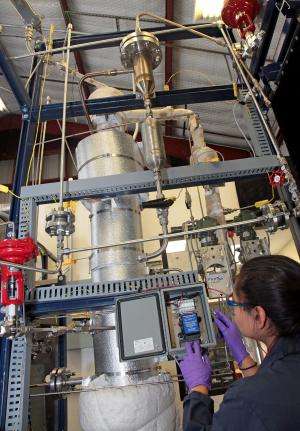SwRI expands biofuels capabilities with custom-designed circulating fluidized bed system

SwRI announced today the addition of a custom-designed circulating fluidized bed (CFB) to convert heavy crude oils or biological feedstock such as corn, into valuable, refined fuel samples that clients can assess for quality and profitability. SwRI's system produces samples at about a half liter per hour, allowing more tests to be run in a shorter time.
The 15 foot tall, 150 square foot CFB is in operation and available to respond to the current push for biofuels, which require catalyst-aided processing of raw materials, or feedstock, derived from biological materials such as algae, corn or wood, or from refinery products such as heavy crude oil. Clients can use a CFB to evaluate new catalysts and determine how plant-derived, bio feedstocks and bio oils can be efficiently integrated into refineries.
The CFB system converts biomass, material derived from plants or wood, to organic liquids using fast pyrolysis, a thermal conversion of organic material in the absence of oxygen. It also can emulate a fluidized catalytic cracking (FCC) unit, a refinery process to convert complex hydrogen molecules to simpler molecules, to convert lower-valued feedstock to higher-value products such as gasoline or diesel. For example, fluidized cataltyic cracking is commonly used in producing gasoline from crude oil.
SwRI's new circulating fluidized bed is flexible in operation to test both fast pyrolysis processes for biomass-to-biofuels conversion technologies and FCC refinery unit operations.
"In the U.S., a pilot-sized CFB such as ours is unique since conventional FCC testing equipment is smaller and produces very small quantities of material for testing," said Eloy Flores, an assistant manager in the Fuels and Energy Development Section in SwRI's Chemistry and Chemical Engineering Division. "We can produce enough material for fuel specification or standardized testing. In addition, we are capable of high riser velocities associated with biomass fast pyrolysis."
SwRI has extensive experience working with unconventional feedstocks and converting them to jet, gasoline and diesel specification fuels. SwRI also evaluates these fuels to determine operation conditions, the feasibility of refinery hydrotreaters (a process for reducing contaminants in the fuels), and to certify biofuels for on-road use through emissions testing.
Provided by Southwest Research Institute




















